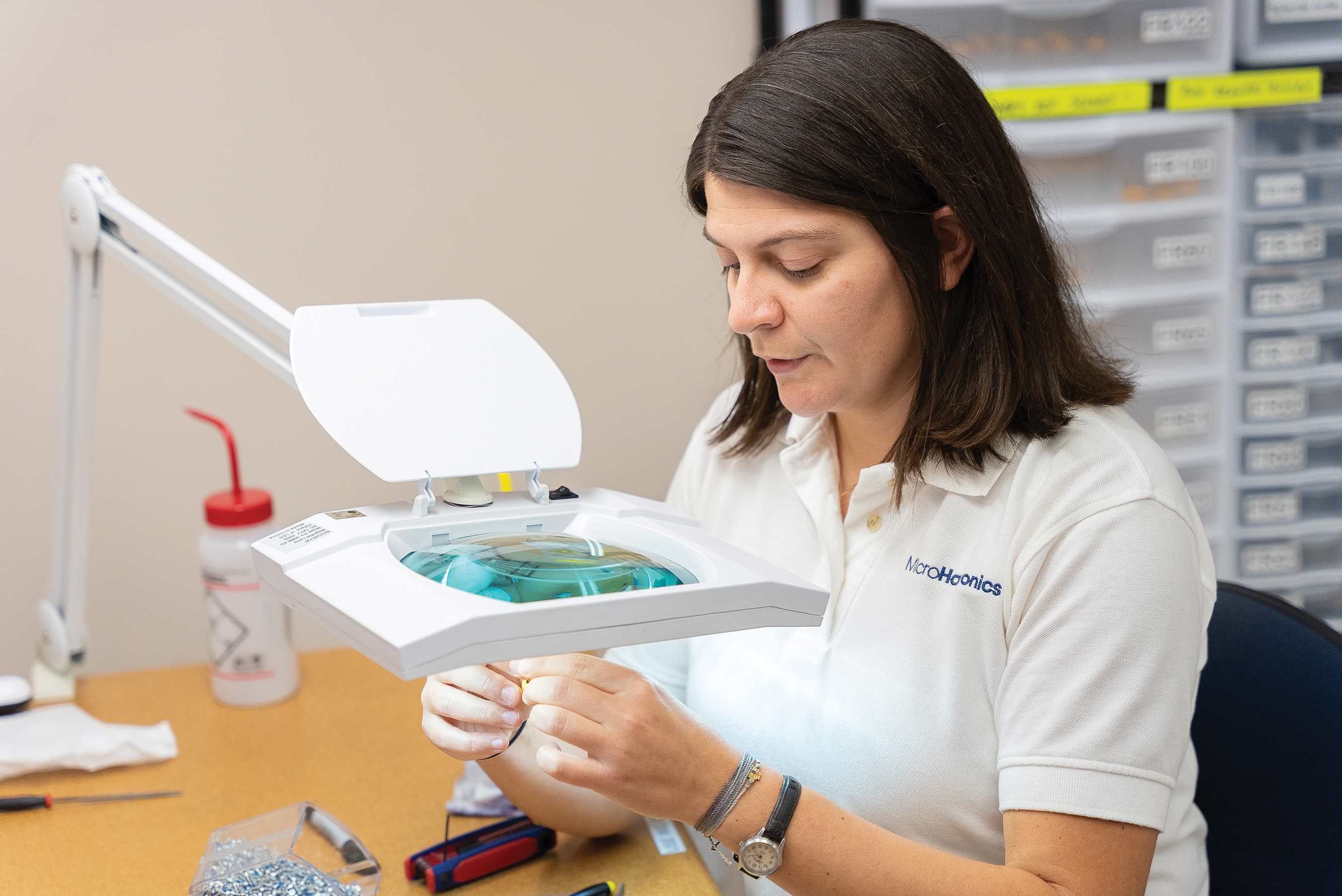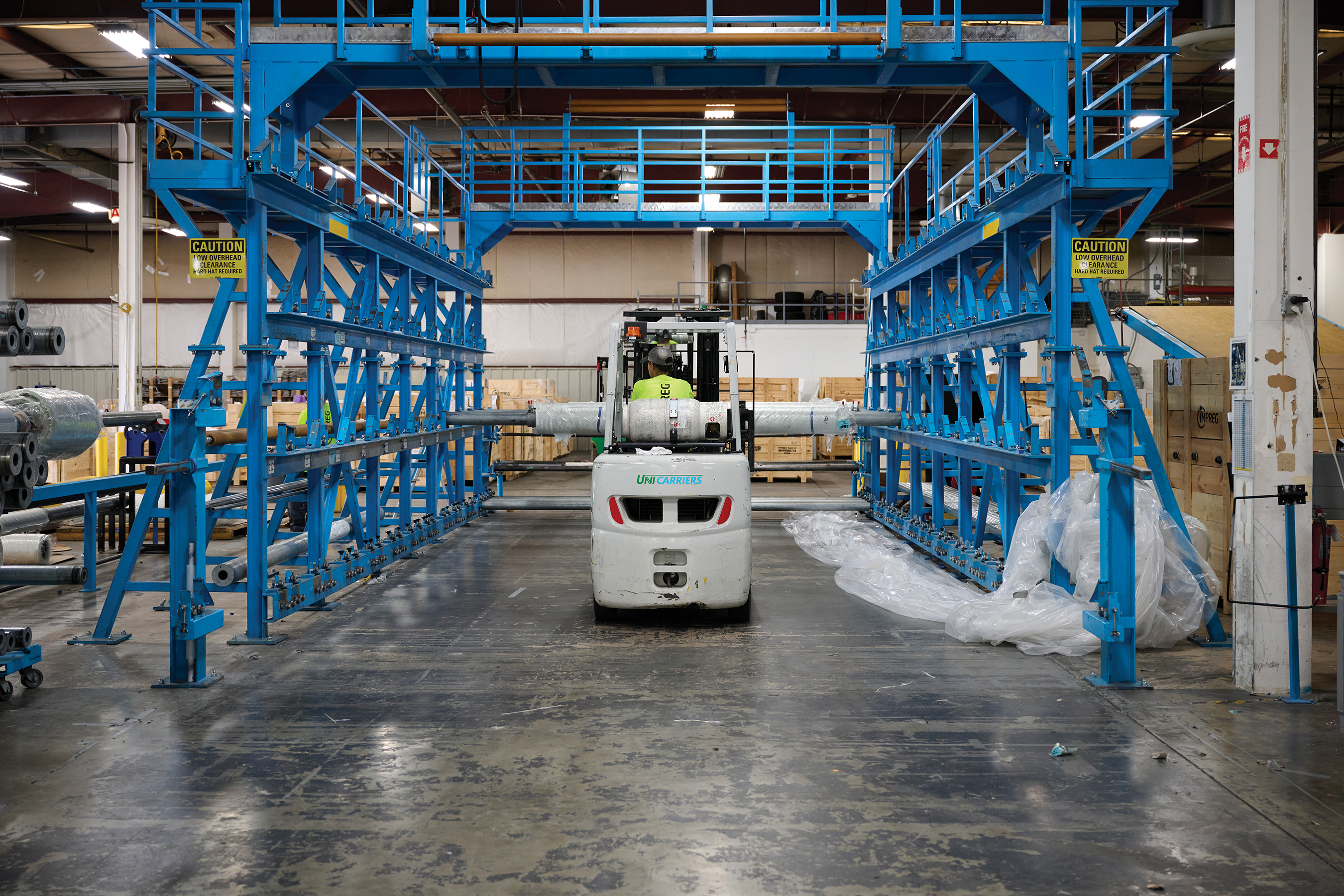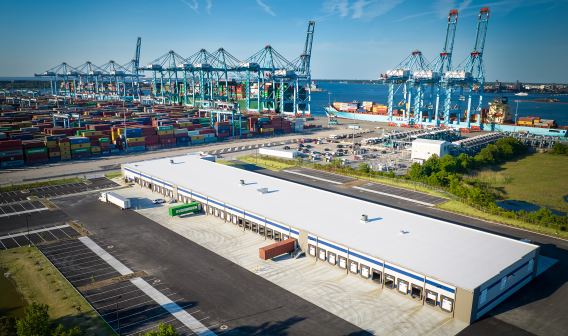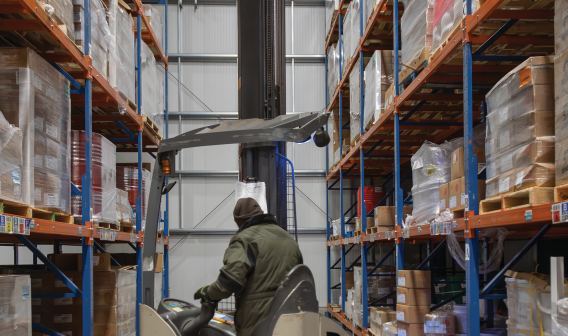Solving Supply Chain Issues at the Source
One is a tiny company with its eyes on the heavens: Micro Harmonics pioneered high-tech designs and components with help from NASA.
The other company is a global leader that does its work beneath the surface: IMPREG builds sustainable liners that seal sewers, and its technology is dominant in Europe.
The companies share this in common: To reach their potential, each Virginia company was selected in 2023 as enrollees in the Supply Chain Optimization Program (SCOP), an initiative run by VEDP’s International Trade Division and the first state-led supply chain assistance program in the country.
The International Trade Division, which was recently honored with the U.S. Department of Commerce’s “E Star” Award for the second time, helps Virginia companies expand exports to drive company growth in the Commonwealth. To increase exports, companies must find cost-effective ways to import the materials and components used in the goods they manufacture.
SCOP, launched in September 2021, selects 20 companies each calendar year to support with funding and expert supply chain guidance. Those companies have employed as many as 750 people and as few as five. But big or small, all benefit.
Big Results in a Tiny Package
Representatives from Micro Harmonics, with just 12 employees, first felt out of place when the company joined SCOP in 2023. “I walked in there and thought, I don’t really fit. And then I thought, ‘Wait a minute, we are all trying to do the same thing.’ [The company’s small size] just meant our problems are a little bit different,” said Micro Harmonics Chief Operating Officer Diane Kees. The SCOP team “was wonderful at pivoting and meeting us right where we were. It had a huge impact on us. We’re set up to be able to grow and grow smoothly.”
That growth has been recognized by others. For a third consecutive year, Micro Harmonics, based in Fincastle, was on the Inc. 5000 Regionals list of fastest-growing private companies.
Micro Harmonics is proof that big possibilities sometimes come in the smallest of packages. Founded in 2008 by Kees’ brother, electrical engineer David Porterfield, the company creates tiny out-of-the-box electromagnetic components that enable high-frequency systems to deliver significantly more data faster than conventional microwaves used in satellites, GPS, and Doppler radar.
That potential, though, comes with challenges. The electromagnetic waves produced are so tiny, the distance between each peak is measured in millimeters. This means the constituent parts must be fabricated with precision to sizes that are so small they can barely be seen with the human eye. These tiny parts must then be aligned at precise angles by highly skilled technicians using powerful microscopes. The final components of competitors might fit into a tissue box; those from Micro Harmonics fit into a matchbox.
Heat is another obstacle. Because the parts are so small and power density is high, localized heating can destroy the tiny parts. To combat that issue, Porterfield invented designs that utilize novel materials, including diamonds grown in a lab, to effectively channel heat away from the tiny parts. The result is that Micro Harmonics components are smaller than other technologies, yet more efficient and able to handle significantly higher power levels.
“We had to come up with a whole different method…something brand new that the world has never had,” said Kees, also an engineer.
Porterfield’s work gained the backing of NASA, which funded his research. But to commercialize, the company needed materials and facilities capable of producing components that would be assembled in Virginia.
Helping Companies Scale Up
Domestic producers of lab-grown diamonds couldn’t keep pace, so Micro Harmonics looked overseas for a supplier. Machining proved an obstacle — no existing facility could do work that required such precision on the tiniest of scales.
SCOP and its partners helped the company get beyond sole sourcing and come up with a systemic way to manage vendors and manufacturers. “The program was amazing,” Kees said.
When potential customers want delivery, Micro Harmonics can’t lose time figuring out what must be done. “I’m an engineer. I’m not really a forecaster. Forecasting seems sort of like waving a magic wand, but that step has to be done,” Kees said.

Micro Harmonics Corporation, Botetourt County
With help from SCOP, Micro Harmonics learned no existing facility could do what it needed after many tried and failed. The company then focused its engineering know-how on finding a new solution. “We had to just come up with a whole different way of doing it that nobody ever thought about before,” Kees explained.
That led to an approach so revolutionary, Micro Harmonics has held off on seeking a patent for fear that doing so might give insight to a potential competitor.
“That sort of insight and action plan is what SCOP delivers,” said VEDP Supply Chain Program Manager Monica Sadie. “Rather than wait for a problem in supplies to emerge, companies are coached to identify vulnerabilities and reduce risks.”
Too many companies sole-source materials or components, so SCOP helps companies diversify suppliers. If one supplier struggles, others pick up the slack.
Such planning requires companies to create a written supply chain operational plan, something many program participants lacked. While some companies employ a supply chain expert, SCOP encourages them to train multiple managers so the absence of one won’t torpedo the ability to plan smartly and react swiftly.
Bespoke Support to Solve Specific Problems
Support by SCOP is customized to each company’s needs. “That’s why we only bring 20 companies each year into the program — because we want to have the time and the bandwidth to assist them in an impactful way,” Sadie said.
That customization was crucial for IMPREG, a world-leading manufacturer of fiberglass-reinforced liners for the rehabilitation of sewer and stormwater pipes using environmentally friendly technology.
The company is dominant in Europe and has manufacturing facilities on four continents, but faced challenges sustaining growth in the Americas after locating a manufacturing facility in 2019 in Chesterfield County near Richmond.
“They have taken the time to listen and understand our pain points and have done everything they can to address those,” said Alain Monyette, a spokesperson for IMPREG Americas.

IMPREG Americas, Chesterfield County
In the United States, when cities repair damaged sewer lines, rather than replace them, most insert liners that are sealed with pressure created by water and heat. But that process pushes harmful resins from the liners into the surrounding groundwater and soil, Monyette said.
IMPREG instead uses ultraviolet (UV) light to seal liners so no resins are released into the environment. That technology has long been the standard in Eastern Europe, where IMPREG and other companies also using UV rehabilitation control about 90% of the market.
“The European Union has a longer history of regulation around environmental protections,” Monyette said.
In the Americas, market share of UV cure is less than 10%, so the potential for growth is massive, but the path is riddled with uncertainty.
“We’re hitting some growing pains, which is why we wanted to start a dialogue with VEDP,” Monyette said. “The decision-makers and the reasons why they choose the IMPREG product are much different here than they are over in central Europe.”
Among the challenges are sourcing raw material quickly so that there aren’t delays in manufacturing liners whose specifications vary for each job. These include not just sizing but strength for load paths, as an example, if the pipe is under a highway or an airport.
IMPREG Americas worked with SCOP to seek local suppliers, said Nur Humayun, the company’s supply chain manager. “That was the first initiative we have done and they are helping us a lot,” he said. To make liners, IMPREG needs seven raw products, including resin and fiberglass, so tracking those products is crucial. SCOP’s expertise “[helps] us to brainstorm and [gives] us some solutions on how to manage these kinds of inventories,” Humayun said.
Help With Scaling Up
Beyond logistics, IMPREG needed help planning its pace of growth. That’s not a problem in Europe, where the company has operated since 1999. Existing robust sales data accurately projects how much growth to plan each year.
Three months after its manufacturing facility launched in December 2019, the COVID-19 pandemic hit, stalling plans by IMPREG to use its experts from Germany to help American leadership, as travel restrictions delayed their arrival by 18 months.
But challenges haven’t dampened company plans or the vision to grow quickly on this side of the Atlantic in ways that respect the environment and each community, Monyette said. Just as his company has persevered to bring its facility to Virginia, SCOP continues to work through difficult issues to help companies shore up their supply chains.




